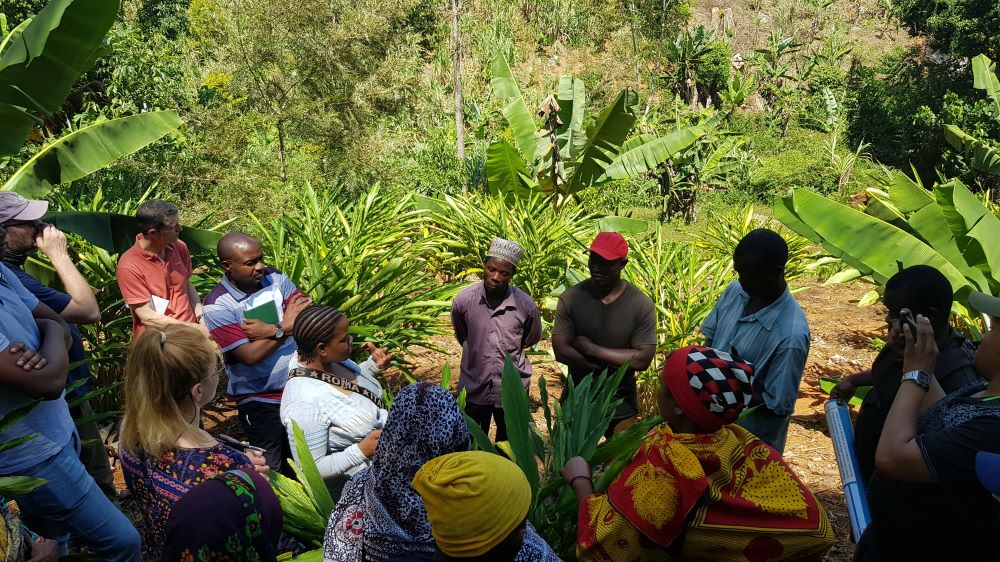By Dr Harriet Smith, Post-doctoral Research Fellow, GCRF-AFRICAP, University of Leeds
To transform agriculture into a climate-resilient sector, the international research and development community is focusing significant effort and investment in achieving and upscaling climate-smart agriculture (CSA), with particular emphasis on delivering benefits to smallholder farmers.
Despite there being a high level of knowledge around what CSA technologies and practises work on the ground, CSA uptake remains low in smallholder farming systems across Africa. Central to this challenge, is poor understanding of how smallholder farmers access beneficial outcomes from changes in agricultural practices, and how to effectively implement CSA at scale.

Over the past four years, collaborative interdisciplinary research led by Dr Susannah Sallu, Marta Gaworek-Michalczenia and Dr Harriet Smith has focussed on the implementation of CSA in Tanzania, alongside other integrated approaches to tackling climate change alongside development.
The research has focussed on two programmes of intervention in Tanga Region:
- The EU’s GCCA+ funded ‘Integrated Approaches for Climate Change Adaptation in the East Usambara Mountains’
- The Climate-Smart Villages program in Lushoto District, implemented by the CGIAR research programme on Climate Change, Agriculture and Food Security (CCAFS)
Using mixed methods and combining qualitative and quantitative analyses, the research has examined various approaches and outcomes of implementing CSA, exploring who does and does not benefit from programme implementation and why, and raising questions about the viability of, and challenges with global ambitions to upscaling CSA.
Six key messages for implementing climate-smart agriculture
Drawing on this empirical research and ongoing collaborative work with project partners in Tanzania, summarized below are six key messages to support future CSA implementation:
1. To increase local capacities and improve coordination of CSA implementation, funding should prioritise long-term in-situ programmes at sub-national levels.
The realisation of benefits from CSA interventions takes time and continued investment. Short-term interventions can also undermine innovation processes, thus improved coordination and increasing capacities at subnational level is key, and funding should prioritise long-term (+10 years) programmes at the local level.
2. CSA interventions need to be designed in partnership with local communities, to better reflect the local context, address local needs and support the least-abled members of society.
Challenges in attending farmer training sessions, particularly for women, the elderly and poorer farmers, demonstrate how the poorest and most vulnerable groups require additional support to participate in, and realise benefits from CSA interventions. Programmes therefore need to be designed in partnership with local communities, to support better understanding of locally-relevant social vulnerabilities, accounting for differences between farmers, to ensure full and meaningful participation amongst smallholder farmers.
3. Where livelihoods are largely dependent on rain-fed agriculture, variable weather is an important factor influencing the vulnerability context of livelihoods.
Programmes designed to reduce livelihood vulnerability must therefore take into account variability and uncertainty and apply risk-informed project design to avoid maladaptive outcomes.
4. CSA programs should meaningfully engage with existing power dynamics to ensure inclusivity.
Some of our research found that program participants were better off than the non-participating households despite the programme’s desire to target the most vulnerable households. Reports of group exclusivity and favouritism in farmer training and financial groups also highlight how an inability to address local social dynamics can lead to membership formation that reinforces prevailing power hierarchies, which excludes marginalised groups and further widens social inequalities. Programs should therefore consider how to meaningfully engage with existing power dynamics to support inclusivity, and build in regular programme evaluation and reflection to address these challenges.
5. Trade-offs between livelihood activities and natural resources are inevitable and need to be considered at design stage to avoid unintended outcomes – and awareness of these built in to programme monitoring.
Programmes can create unintended externalities, such as reduced access to extension staff due to their involvement in programme facilitation. Narrow metrics for monitoring, evaluation and reporting, risks overlooking unintended outcomes. Combining quantitative and qualitative methods, including ethnographic approaches, can support more holistic and nuanced understandings of programme outcomes.
6. Efforts to promote CSA practices and technologies should simultaneously support off-farm activities.
Finances, labour availability and markets are central to decisions around farm management practices. The uptake and continual use of investment-heavy technologies, such as the creation of terraces and improved seed varieties, also requires consistent income generation. As such, smallholder farming systems are diverse and draw on a range of resources, including off-farm activities and enterprises. Programmes should consequently support off-farm activities to nurture on-farm innovation and uptake of CSA technologies and practices.
Webinar on 31 March
This research was discussed during ‘Implementing Climate-Smart Agriculture: Innovation, Inclusivity and Capacity-Building’, a free webinar from the GCRF-AFRICAP seminar series. Read the webinar recap, watch the recording, or download presenter slides.
Latest research findings published online
Smith H, Recha J, Sallu S, Whitfield S, Sayulla G, Mziray S, Gaworek-Michalczenia M. 2021. Smallholder farmers’ innovation systems in climate-smart agriculture: Interview findings from Tanga Region, Tanzania. CCAFS Info Note. Wageningen, the Netherlands: CGIAR Research Program on Climate Change, Agriculture and Food Security (CCAFS). https://hdl.handle.net/10568/113049
About the Author

Dr Harriet Smith is an interdisciplinary environmental scientist, working as a Research Fellow on the GCRF-AFRICAP programme. Her research focusses on understanding how farmers adapt to climate change, by examining how they learn and use different agricultural practices. In the context of Agricultural Development Programmes in Tanzania, her work explores how agricultural innovation happens, to examine who has access to, and is able to benefit from Development Programmes, who does not, and why.
